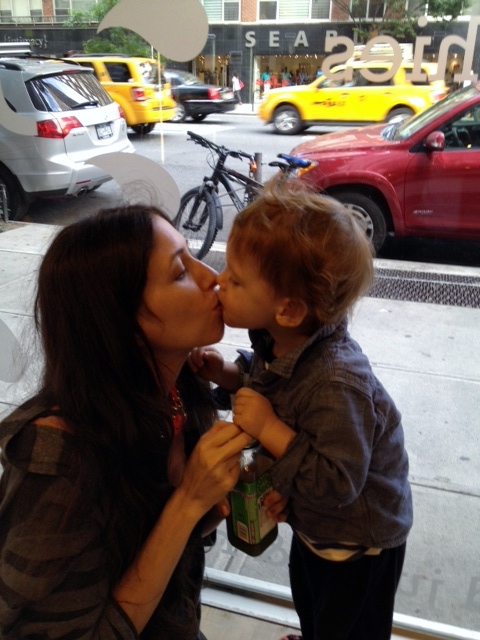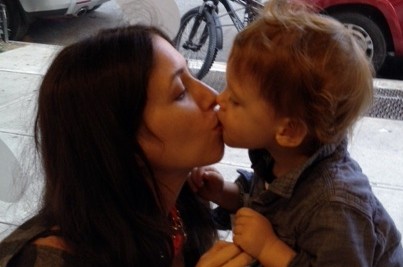We all crave those close moments with our children that make our hearts melt. Connection is as essential to us parents as it is to our children. When our relationship is strong, it’s also sweet — so we receive as much as we give. That’s what makes parenting worth all the blood, sweat and tears.
That connection is also the only reason children willingly follow our rules. Kids who feel strongly connected to their parents WANT to cooperate. They trust us to know what’s best for them, to be on their side. I hear regularly from parents that everything changes once they focus on connecting, not just correcting.
But we’re only human. There are days when all we can do is meet our children’s most basic needs: Feed them, bathe them, keep an encouraging tone, hug them, and get them to sleep at a reasonable hour so we can do it all over again tomorrow. Given that parenting is the toughest job on earth — and we often do it in our spare time, after we work at another job all day — the only way to keep a strong bond with our children is to build in daily habits of connection. What kinds of habits?
“We need 4 hugs a day for survival. We need 8 hugs a day for maintenance. We need 12 hugs a day for growth.” — Virginia Satir

with Your Child
10 Habits to Strengthen Your Relationship with Your Child
1. Aim for 12 hugs (or physical connections) every day. Hug your child first thing in the morning, when you say goodbye, when you’re re-united, at bedtime, and often in between. If your tween or teen rebuffs your advances when she first walks in the door, realize that with older kids you have to ease into the connection. Get her settled with a cool drink, and chat as you give a foot rub. (Seem like going above and beyond? It’s a foolproof way to hear what happened in her life today. You’ll find yourself glad, many times, if you have that high on your priority list.)
2. Connect before transitions. Kids have a hard time transitioning from one thing to another. If you look her in the eye, use her name, and play a bit to get her giggling, you’ll fill her cup and make sure she has the inner resources to manage herself through a transition. Mornings go much easier when you start with a five minute snuggle upon awakening to help your child transition from sleep into the executive functions of dressing and teeth brushing.
3. Play. Laughter and rough-housing keep you connected with your child by stimulating endorphins and oxytocin in both of you. Making playfulness a daily habit also gives your child a chance to work through the anxieties and upsets that otherwise make him feel disconnected — and more likely to act out. And play helps kids want to cooperate. Which is likely to work better, “Little Gorilla, it’s time for breakfast, come eat your bugs and bananas!” and “Don’t you think your steam shovel wants to get in the car now so he can see the construction site on the way to the store?” or “Eat your breakfast now!” and “Get in the car!”
4. Turn off technology when you interact with your child. Really. Your child will remember for the rest of his life that he was important enough to his parents that they turned off phones and music to listen to him. This is particularly important in the car, because the lack of eye contact in a car takes the pressure off, so kids (and adults) are more likely to open up and share.
5. Special time. Every day, 15 minutes with each child, separately. Alternate doing what your child wants and doing what you want. On her days, just pour your love into her and let her direct. On your days resist the urge to structure the time with activities. Instead, play therapeutic “games” to help your child with whatever issues are “up” for her. (For game ideas, click here.)
6. Welcome emotion. Sure, it’s inconvenient. But your child needs to express his emotions or they’ll drive his behavior. So accept the meltdowns, don’t let the anger trigger you, and welcome the tears and fears that always hide behind the anger. Remember that you’re the one he trusts enough to cry with, and breathe your way through it. Afterwards, he’ll feel more relaxed, cooperative, and closer to you. (Yes, this is really, really hard. Regulating our own emotions is the hardest part of parenting. But that doesn’t mean we’re excused from trying.)
7. Listen, and Empathize. Connection starts with listening. Bite your tongue if you need to, except to say “Wow!….I see….Really?…How was that for you?” The habit of seeing things from your child’s perspective will ensure that you treat her with respect and look for win/win solutions. It will help you see the reasons for behavior that would otherwise drive you crazy. And it will help you regulate your own emotions so when your buttons get pushed and you find yourself in “fight or flight,” your child doesn’t look so much like the enemy.
8. Slow down and savor the moment. Share the moment with your child: let him smell the strawberries before you put them in the smoothie. Put your hands in the running water together and share the cool rush of the water. Smell his hair. Listen to his laughter. Look him in the eyes. Connect in the magnificence of the present moment. Which is really the only way we can connect.
9. Bedtime snuggle and chat. Set your child’s bedtime a wee bit earlier with the assumption that you’ll spend some time visiting and snuggling in the dark. Those companionable, safe moments of connection invite whatever your child is currently grappling with to the surface, whether it’s something that happened at school, the way you snapped at her this morning, or her worries about tomorrow’s field trip. Do you have to resolve her problem right then? No. Just listen. Acknowledge feelings. Reassure your child that you hear her concern, and that together you’ll solve it, tomorrow. The next day, be sure to follow up. You’ll be amazed how your relationship with your child deepens. And don’t give this habit up as your child gets older. Late at night is often the only time teens will open up.
10. Show up. Most of us go through life half-present. But your child has only about 900 weeks of childhood with you before he leaves your home. He’ll be gone before you know it. Try this as a practice: When you’re engaged with your child, just be right here, right now. You won’t be able to do it all the time. But if you do it every day for a bit, you’ll find yourself doing it more and more. Because you’ll find it creates those moments with your child that make your heart melt.
Choose love!
Dr. Laura
Dr. Laura Markham is the author of Peaceful Parent, Happy Kids: How To Stop Yelling and Start Connecting. To learn more visit AhaParenting.com.


